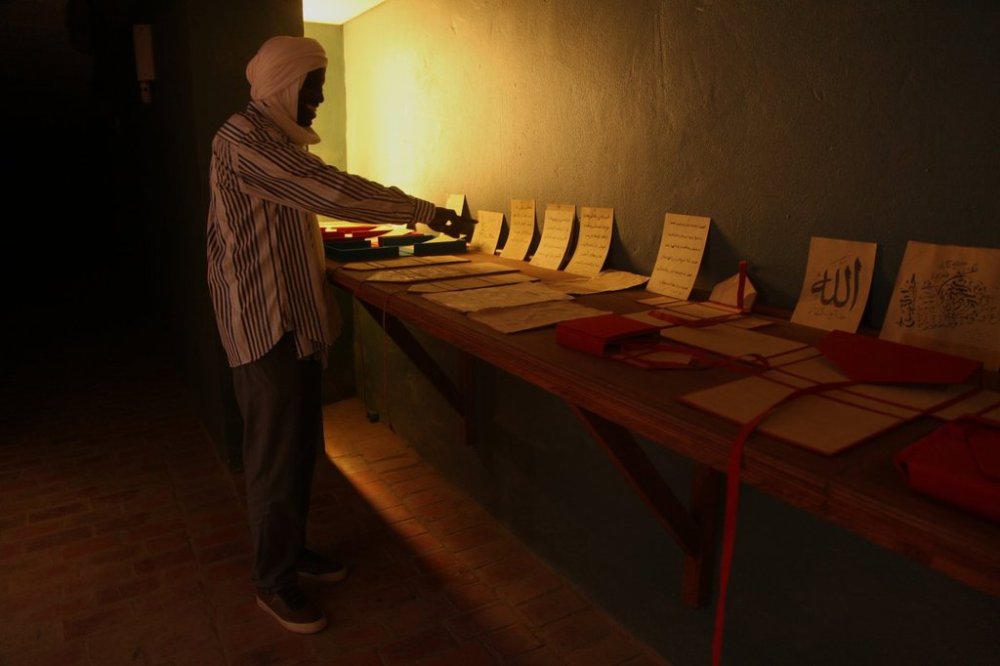World
Timbuktu’s Manuscripts Return After 13 Years of Protection

Thirteen years after the threat of al-Qaida extremists loomed over Timbuktu, the city’s cherished manuscripts have returned home. Abdoulaye Cissé, the general secretary of the Ahmed Baba Institute of Higher Islamic Studies and Research, undertook a perilous journey in 2012, smuggling approximately 28,000 fragile manuscripts to safety. This monumental task was executed under the cover of darkness, as militants seized control of the historic desert town.
Cissé and his team were acutely aware of the cultural significance of these manuscripts, which contain invaluable records of West African history and scholarship. Working discreetly, they transported the manuscripts over 1,200 kilometers to Mali’s capital, Bamako, utilizing donkey carts and wooden boats. The entire operation took a month, underscoring the risks involved as they navigated through hostile territory.
In August 2023, local leaders and civil society successfully requested the return of these manuscripts to Timbuktu. The government of Mali has framed this event as a significant victory for cultural preservation, especially given the concerns regarding the humidity in Bamako that could damage these historical documents.
While the return of the manuscripts is a cause for celebration, al-Qaida’s presence in the region continues to pose a serious threat. The militant group attacked Timbuktu as recently as June 2023, and its affiliate, the JNIM group, has imposed a fuel blockade on the country, contributing to the instability of the military regime.
Timbuktu, once a vibrant center of Islamic learning, is home to numerous private libraries estimated to contain around 377,000 manuscripts in total. All these documents were also smuggled to Bamako for safekeeping. According to Mohamed Diagayeté, director of the Ahmed Baba Institute, the manuscripts offer a unique glimpse into a history that challenges the notion that African civilizations relied solely on oral traditions.
The manuscripts provide a rich archive of interactions among various West African empires and tribes, featuring letters discussing topics like the morality of tobacco use and records that grant women the right to seek justice. One notable manuscript warns against imposing oneself on women, highlighting a long-standing tradition of tolerance and respect in the region’s interpretation of Islam.
The arrival of al-Qaida in 2012 marked a devastating shift. The militants destroyed more than 4,000 manuscripts, some dating back to the 13th century, as documented by a United Nations expert mission. They also targeted Timbuktu’s renowned mausoleums and UNESCO World Heritage Sites, igniting a global call to protect the city’s cultural treasures.
In response to this crisis, significant strides have been made in the preservation of the manuscripts. Before the smuggling operation, only 20% of the manuscripts had been digitized. Today, nearly all are digitized, with backups securely stored on remote servers, ensuring their safety against potential future threats. Cissé stated, “Even if one server is damaged, we can still recover these manuscripts.”
Despite these advancements, challenges remain. Many manuscripts still reside in aging mud-brick libraries, although institute staff assert that their holdings are now in a more secure location with plans to install surveillance cameras.
Timbuktu’s residents, who hold a deep appreciation for their history, strive to balance the protection of these manuscripts with accessibility. “As long as these manuscripts remain in trunks, they remain dead because people cannot enjoy them,” remarked Sane Chirfi Alpha, a founding member of the nonprofit SAVAMA-DCI dedicated to their preservation.
For students like Baylaly Mahamane, 24, these manuscripts are a source of inspiration. Mahamane aims to study herbal medicine practices documented in the texts to help treat patients in Timbuktu hospitals who lack access to modern medicine. One such text describes traditional remedies, including the use of white wormwood leaves for stomach ailments and clay to alleviate swollen feet.
The return of the manuscripts marks not just a triumph for cultural preservation but also a testament to the resilience of Timbuktu’s people and their dedication to safeguarding their rich heritage.
-

 Science3 months ago
Science3 months agoToyoake City Proposes Daily Two-Hour Smartphone Use Limit
-

 Top Stories3 months ago
Top Stories3 months agoPedestrian Fatally Injured in Esquimalt Collision on August 14
-

 Health3 months ago
Health3 months agoB.C. Review Reveals Urgent Need for Rare-Disease Drug Reforms
-

 Technology3 months ago
Technology3 months agoDark Adventure Game “Bye Sweet Carole” Set for October Release
-

 World3 months ago
World3 months agoJimmy Lai’s Defense Challenges Charges Under National Security Law
-

 Lifestyle3 months ago
Lifestyle3 months agoVictoria’s Pop-Up Shop Shines Light on B.C.’s Wolf Cull
-

 Technology3 months ago
Technology3 months agoKonami Revives Iconic Metal Gear Solid Delta Ahead of Release
-

 Technology3 months ago
Technology3 months agoApple Expands Self-Service Repair Program to Canada
-

 Technology3 months ago
Technology3 months agoSnapmaker U1 Color 3D Printer Redefines Speed and Sustainability
-

 Technology3 months ago
Technology3 months agoAION Folding Knife: Redefining EDC Design with Premium Materials
-

 Business3 months ago
Business3 months agoGordon Murray Automotive Unveils S1 LM and Le Mans GTR at Monterey
-

 Technology3 months ago
Technology3 months agoSolve Today’s Wordle Challenge: Hints and Answer for August 19









